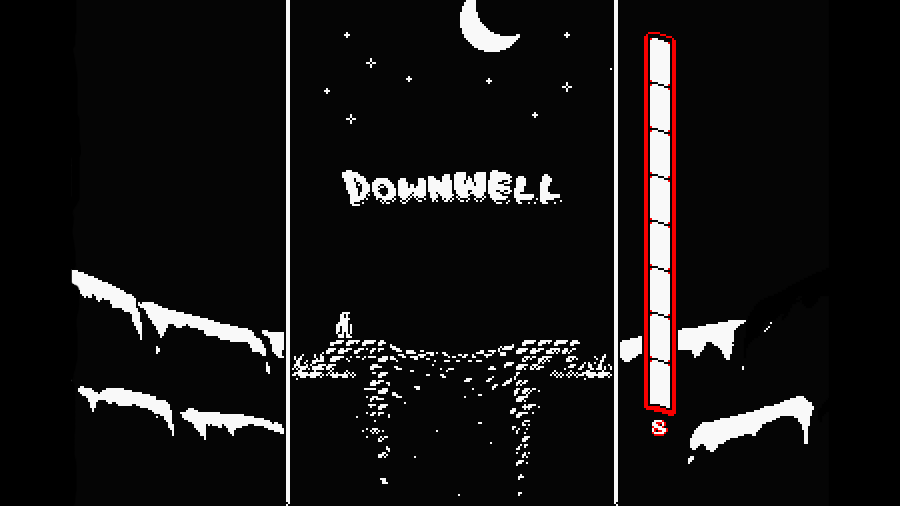
Despite not being the biggest or longest game, Downwell amazed me on release because of its daring simplicity, enormous depth, and low price tag. But, does it live up to the hype even through 5 years of age?
Platforms: Nintendo Switch, PlayStation 4, iOS, Android, PC [Reviewed], PlayStation Vita
Developer:Moppin
Release: October 15, 2015
MSRP: $2.99
Downwell is an unusual game that challenges conventions in the best way possible. While many platformers have you side-scrolling or ascending, Downwell has you descending down a dark and dingy well seeking fame and glory. For most games, this angle would be impossible. After all, if gravity takes hold then you have nowhere to go but down, limiting options for gameplay and removing player agency. But, Downwell solves this by giving the player the freedom to shoot downwards, jump on enemies, and otherwise slow their descent for extra bonuses, as well as extra risk.
Throughout your Downwell journey, you will receive upgrades, go to shops, unlock new palettes and styles, and get better after each run. But, every upgrade only serves to augment an already extremely fleshed out system in Downwell’s movement.
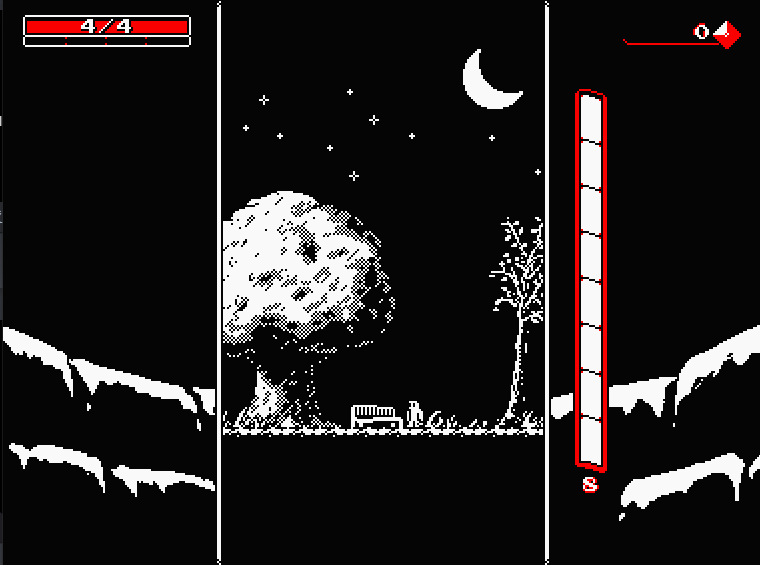
Movement is extremely important for platformers, and if one gets it wrong, it can often spell doom for the game in question. Many platformers nowadays feature clunky, overcrowded controls with many actions for attacking and progressing. Downwell solves this problem by limiting controls to three main actions: move, jump, and shoot.
Downwell’s movement can seem sluggish at first, until you begin to experiment with it. As you play the game, you are mastering one of the most perfect systems of momentum I’ve ever encountered. Every jump feels inherently liberating, and as you master it it becomes second-nature extremely quickly.
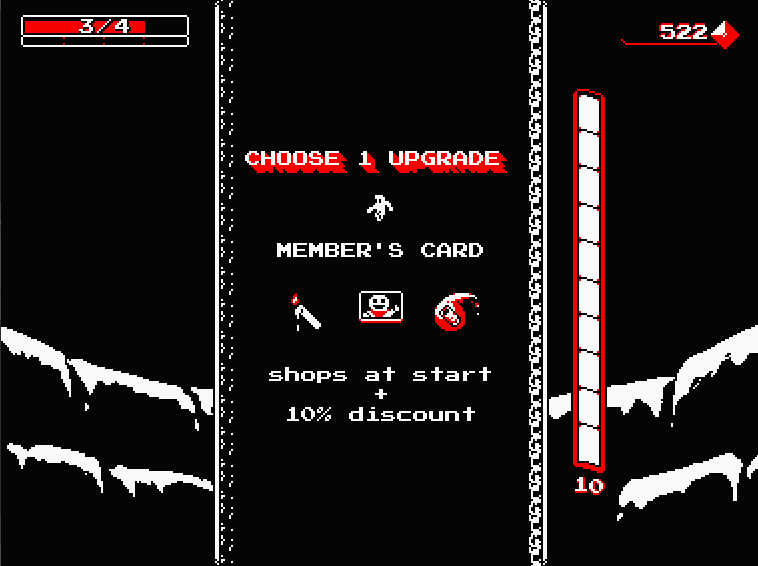
As an added bonus, with every enemy you kill, you gain combo points that decay when you touch the ground. These allow you to restore health, increase your ammo count, and grow in power without finishing a level or buying an item. If you’re good enough, you can get a max combo with every level and restore life in order to extend your run. I cannot emphasize enough how important these combos are, as they are often the best way to increase your survivability.
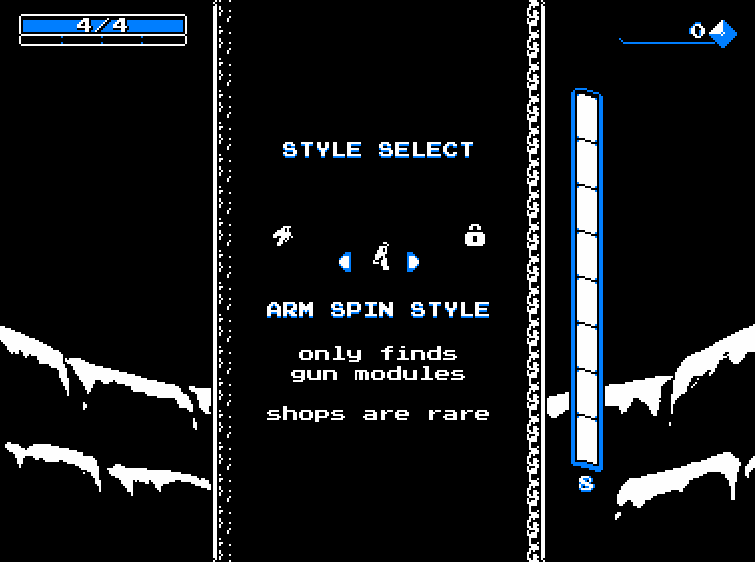
If you’re just starting out, Downwell can seem intimidating because the combos are fast moving and sometimes luck-based, depending on enemy spawns and your ammo heading into an encounter. But, Downwell mitigates this by providing obstacles you can jump on that serve to delay the inevitable loss of combo and give your brain precious milliseconds to think.
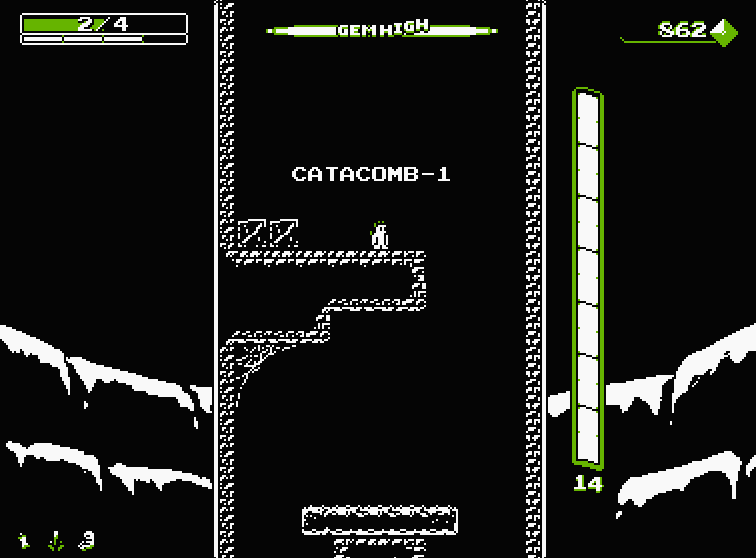
When you first start out, a platform is a sign of safety. But, when you’re running around with a 20+ combo over your head, platforms are much more obstacles than they are places of asylum. Enemies become opportunities very quickly. It is in this way that Downwell subverts norms about platformers and roguelikes, and establishes itself as a genuine classic.
In terms of music, it is very thematic, but catchy. My least favorite track was world 2, but that doesn’t mean it doesn’t fit the graveyard aesthetic. The world 1 music does extremely well at getting the player into a new run, which is good because you will be hearing it often. The general sound design and presentation are weaker than the music, with some sounds being harsh on the ears (The opening title screen is a good example). But, others, despite the pixel art arcade theme, are both clear in their message and a pleasure to listen to.
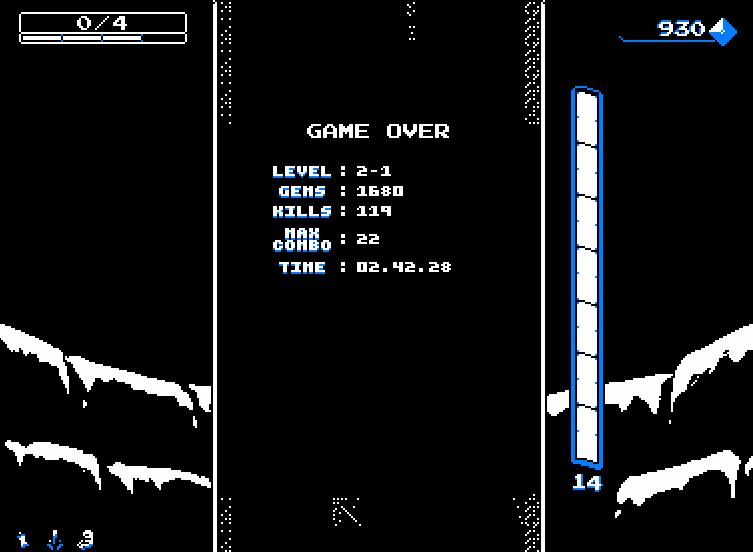
The art style of Downwell may be its strongest point. Enemies are clearly labelled so that even when you’ve never been to a world you can tell which ones will hurt you and which ones are combo food. The pixel art graphics are simple, as is the rest of the game, but this helps rather than hurts the fast-paced, chaotic experience. Visual clarity is extremely important in a game like this, and Downwell nails it. In addition to this, simple actions like entering a side room, freezing time, and taking damage are clearly given cues so that the player knows when they have happened. You never end a run thinking that the game cheated you, or that there was some weird mechanic you didn’t know about that caused you to make a dumb decision.
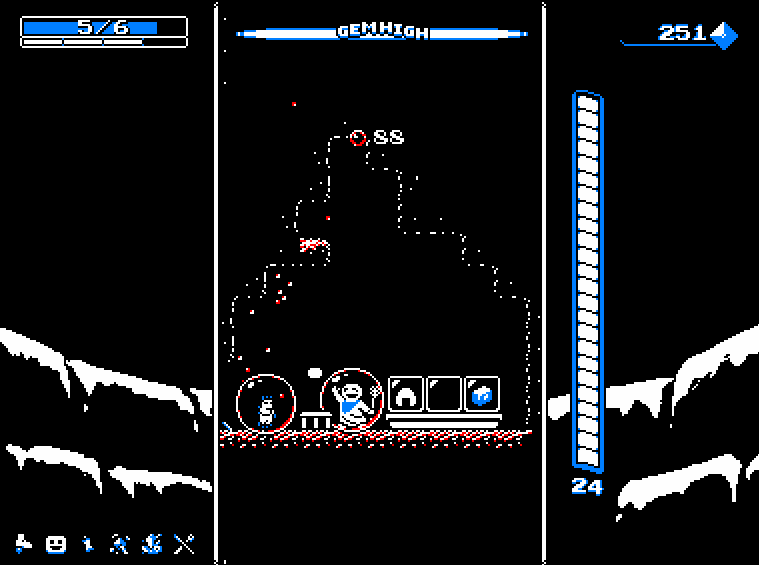
In my Downwell journey I never felt like I was fighting the game, I felt like I was working with it to pull off flashy, quick, and precise, moves. When I succeeded in getting a max combo, I felt really cool. There are very few games that I can legitimately say have done that to me. Despite that, I would never binge Downwell for hours/days at a time. This is a game that you pick up, play two or three times a day, and then put down. Give yourself time to slowly improve at the game, otherwise you may end up frustrated. Despite that, Downwell deserves a spot among the best as an exceptionally fun, simple, and interesting roguelike.
Pros:
- Movement is excellent, with just the right amount of momentum to feel liberating and fun
- Plenty of Replay Value
- Cheap
- Short and Sweet
- Challenging
- Charming pixel art aesthetic
- Available on many systems
Cons:
- Music can be repetitive sometimes
- Only 3 or 4 color palettes are usable, the rest are borderline detrimental to the player
- Movement can feel sluggish and unresponsive at first
- Works better with a controller
Verdict:
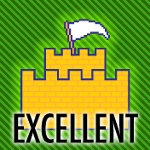
Excellent
Excellent games have our official recommendation and are examples of what every game should strive to be. These games feature exciting gameplay, engaging stories (when applicable), intuitive controls and movement, polished and fitting presentations, and good value. Above all else, these games are truly fun to play.
Want to know what this score means? Check out our Scoring Guidelines page.
About the Author:
Collin Westbrook
Collin Westbrook joined in 2010 to help with Zelda Castle, and has since rejoined the staff multiple times throughout Nintendo Castle's existence. He is a lover of strategy games, platformers, and everything Nintendo. Look out for him editing guides, writing articles, and helping the site in whatever way he can.